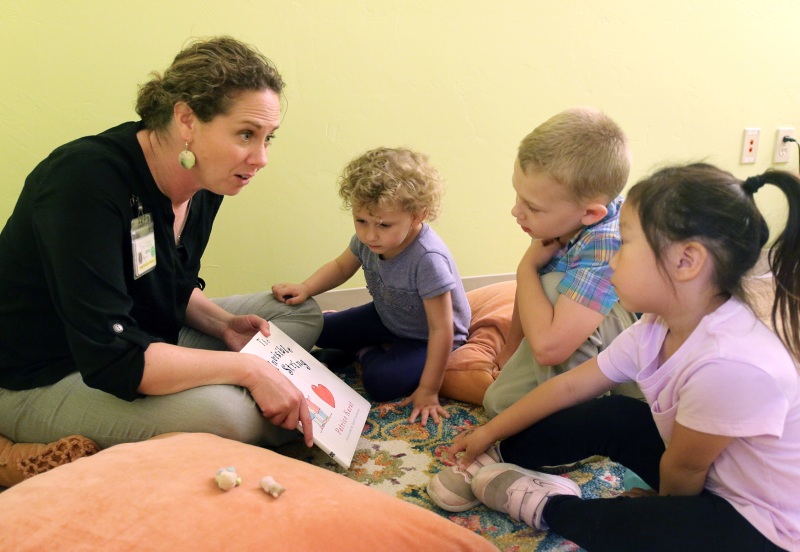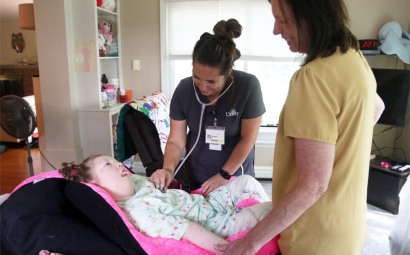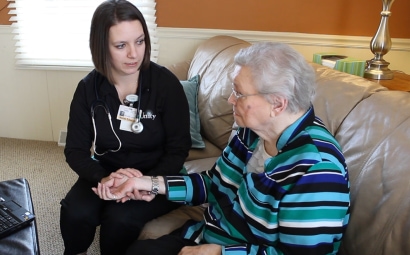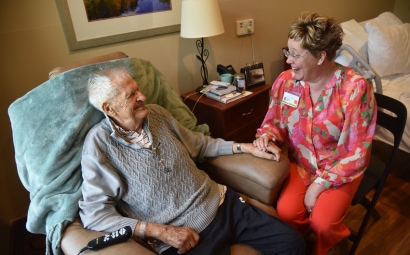Important Questions to Ask Before Choosing a Hospice Provider
Choosing a hospice provider is about finding the right fit for your loved one’s unique needs and your family’s peace of mind. It is a deeply personal decision.
You may think all hospice programs are the same. They are not. Although all hospice providers are required to provide basic core services, major differences exist in the depth and breadth of support offered. When researching hospice providers, it is crucial that you feel empowered to make an informed decision. Afterall, your decision will determine your loved ones’ quality of life during the final months of life. The Medicare Hospice Benefit requires that patients and families be given all available choices when hospice care is being considered. You should never feel pressured or intimidated in your decision-making process, but rather respected and supported.
Compare different hospices, their services, their history, their values, and their quality of care. By understanding these differences, you can make an informed choice during a challenging time, ensuring that you receive the highest quality care. Use the questions below to compare hospice providers to ensure you receive the compassionate end-of-life care you deserve. Remember, the right hospice can profoundly impact your loved-one’s final chapter.
Choose a hospice that respects your wishes and prioritizes your loved one’s comfort and dignity. Your choice matters.
History and Reputation – Does the hospice have:
- Long standing community roots? Is the hospice locally owned and trusted with a 48+ year track record of providing care to the community? Hospice providers deeply embedded in their communities deliver the highest quality of care.
- Nonprofit Status? Studies conducted by the Journal of the American Medical Association show caregivers whose family members received care in a nonprofit hospice reported the best experiences across eight categories — from timely care and help with symptoms to emotional, religious, and grief support. For-profit hospices scored lower across all of these categories. A good rule of thumb is that nonprofit hospices maintain higher quality standards, more patient visits, accept more complex/costly cases, provide more resources, invest more in staff training, provide greater access to care, and offer inpatient hospice. This is due to nonprofits’ focus on holistic well-being rather than financial gain. For more information about the benefits of choosing a nonprofit hospice, visit the nonprofit difference.
- Positive testimonials and reviews from existing and previous patients, families, and clients?
Staff Expertise – Does the hospice team include:
- Full-time doctors credentialed in hospice and palliative care and nurse practitioners in pain management?
- Local nurses, social workers, certified nursing assistants, and chaplains who ensure prompt pain and symptom control, emotional support, and spiritual guidance?
- Specialty trained staff in dementia, Alzheimer’s, heart disease, COPD, and cancer care?
- Specialty trained staff who care for infants and children facing serious illness?
- Specialty trained staff who recognize and support the needs of Veterans while promoting dignity, appreciation, and respect?
- Screened and trained volunteers who provide companionship, vigil sitting, and respite care?
- 24/7 phone triage nurses for around the clock support?
Visits – Does the hospice offer:
- Care in all settings? Even if your loved one is at home now, they may eventually transition to a facility as their needs evolve. Does the hospice provide care at local hospitals, assisted living facilities, nursing homes, and around-the-clock inpatient hospice facility?
- 24/7 in-person visits including weekends and holidays?
- Help creating advance directives and other end-of-life plans?
Programs and Services – Does the hospice offer:
- Inpatient hospice facility? If your hospice provider offers an inpatient center, your loved one can receive around-the-clock care they need in a peaceful setting for complex symptom relief, to give the family a break from caregiving, or for care until the end of life.
- Respite care to provide short-term relief for primary caregivers, giving them time to rest, travel, or spend time with other family and friends?
- Pet therapy visits?
- Evidence-based skilled touch with intentional, compassionate presence to reduce pain, anxiety, agitation, and depression?
- Custom music playlist based on your loved one’s music preferences and converted to a QR code enabling you, family, and caregivers to play the music at any time on a digital device to boost mood and stimulate communication and memories?
- Specialized care and recognition for veterans including custom care plans, Veteran to Veteran Volunteer companions, veteran pinning ceremonies, and flag raising ceremonies?
- Non-medical home care program that can be added to hospice care for even more support including housekeeping, meals, errands, companionship, and more?
- Teleconnect to virtually connect your loved one with hospice staff and family members?
- Medications and supplies delivered to your doorstep?
- Gifted Wishes program which grants the final wishes of hospice patients?
- A complimentary, keepsake legacy journey to document your loved one’s life stories and experiences?
- Keepsake bears and pillows handcrafted from the apparel of your loved one?
Grief Support Services- Does the hospice offer:
- Free-standing Grief and Education Center offering grieving individuals of all ages a safe haven to learn about grief, share experiences, and find hope.
- Licensed grief counselors, social workers, and trained volunteers who provide compassionate grief support at no cost?
- Individual and family counseling provided in-person or virtually?
- Grief groups for children, teens, families, and adults to connect with others who are grieving?
- Telephone check-ins as requested?
- Mailed grief resources over the course of 13 months offering tips for practical coping strategies?
- A grief resources lending library containing a wide variety of printed materials to help you know what to expect during grief?
- Memorial services throughout the year, including the holiday season, to gather with others and honor your loved one?
- Anticipatory grief support because grief can start before the death?
- Grief consultation, workshops, and training for businesses, schools, and the community?
Access Our Toolkit of Resources
- How Hospice Helps
- Hospice Myth vs Fact
- Signs to Start Hospice Care
- Hospice Comparison Checklist
- Grief Support Comparison Checklist


Extensive Grief Support Services Matter
It is important to ask a hospice provider if they have a robust bereavement and grief support program.











